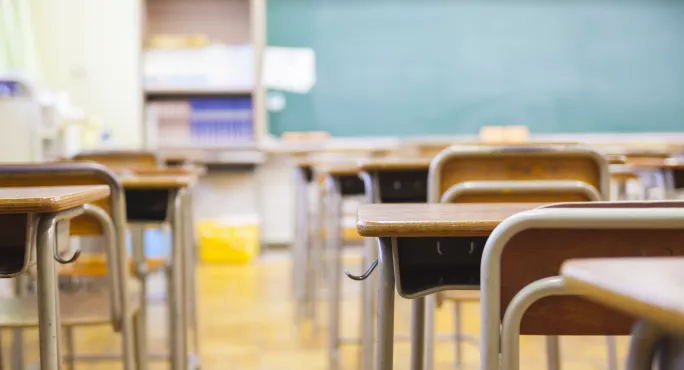Covid: Pupil absence rises by nearly 30,000 in fortnight

An estimated 236,000 pupils in state-funded schools did not attend school for Covid-19 related reasons on 9 December, up from 208,000 two weeks earlier, new government data shows.
Teacher and school leader absence due to Covid-19 has increased by 20 per cent over the past fortnight, with 12,481 absent last Thursday because of the virus.
Today’s Department for Education data ”comes as no real surprise given the current situation nationally”, a heads’ union leader has said.
Paul Whiteman, general secretary of the NAHT school leaders’ union, also said he was concerned that “this data is already out of date and actually underestimates the scale of the issue schools are currently dealing with”.
On 9 December, 2.9 per cent of pupils were absent for Covid-related reasons - up from 2.6 per cent on 25 November, the government figures show.
- Omicron: Masks back in communal areas to combat Omicron variant
- Covid: ‘Very sharp’ rise in teacher and pupil absence
- Omicron: School leaders ‘in dark’ on Omicron contact testing plan
Among pupils absent for Covid-related reasons on 9 December, the main reasons were:
- Pupils with a confirmed case of Covid (1.3 per cent).
- Pupils with a suspected case of Covid (1.1 per cent).
Attendance in state-funded primary schools was 90.7 per cent on 9 December, down from 91.1 per cent on 25 November.
In state-funded secondary schools, attendance was 87.3 per cent, down from 87.5 per cent two weeks earlier.
Mr Whiteman said that even over the last few days, members had seen a ”significant jump in Covid cases in schools, amongst both staff and pupils, as the new variant has started to spread”.
“Some have told us that this has been the hardest term of the whole pandemic,” he said.
He added: “Doing nothing is not a plausible or realistic option.
“It is essential that the government does everything in its power now to reduce the spread of Covid in schools. That should include reviewing mitigation measures that could be reintroduced whilst transmission rates are high.”
Geoff Barton, general secretary of the Association of School and College Leaders, also appealed to the government to better support schools in light of today’s absence figures.
In particular, his members needed help with Covid testing, ventilation and the financial cost of supply cover, he said.
He also urged the DfE “to communicate any new plans and measures in connection with the Omicron variant promptly and clearly”.
Speaking on BBC Radio 4 this morning, Mr Barton had said that one school has had around 25 per cent of its staff off for three weeks due to the coronavirus.
New guidance
On 25 November, masks were reintroduced in communal areas for pupils in secondary schools and staff in all schools, after the Omicron variant was found in the UK.
As of 13 December, there were 4,713 confirmed cases of Omicron in the UK, but health secretary Sajid Javid yesterday warned that Omicron was infecting around 200,000 people a day in the UK, according to the UK Health Security Agency (UKHSA).
According to new government guidance, school pupils of 5 and above, and staff who are double jabbed, will be expected to take daily tests if they are identified as close Covid contacts.
The rule does not apply to unvaccinated adults who are expected to self-isolate.
Calls for action in January
A month ago, Covid absences were down after a “circuit breaker” half term.
But with absences now rising, the NASUWT teaching union yesterday called for the staggered return of pupils to schools and colleges in January, while headteachers warned that schools were having to close in the wake of Omicron chaos.
This came after prime minister Boris Johnson warned of a “crisis” on Sunday and a headteachers’ leader warned that schools had been “left in the dark” about what the major Covid policy changes meant for schools.
In December last year, then education secretary Gavin Williamson threatened legal action against Greenwich council in London if it failed to keep its schools open to all pupils until the end of term.
A DfE spokesperson said: “We are incredibly grateful to teachers and all education staff for their efforts to protect face-to-face education. The classroom is the very best place for children and young people’s development, and making sure children are learning face-to-face continues to be a priority.
“We have taken action that will help manage the Omicron variant, including asking older students and staff to wear face coverings in communal areas and asking secondary schools to offer on-site testing at the start of the spring term.
“We strongly encourage everyone to keep testing regularly and get their booster jabs as soon as possible.”
You need a Tes subscription to read this article
Subscribe now to read this article and get other subscriber-only content:
- Unlimited access to all Tes magazine content
- Exclusive subscriber-only stories
- Award-winning email newsletters
Already a subscriber? Log in
You need a subscription to read this article
Subscribe now to read this article and get other subscriber-only content, including:
- Unlimited access to all Tes magazine content
- Exclusive subscriber-only stories
- Award-winning email newsletters



